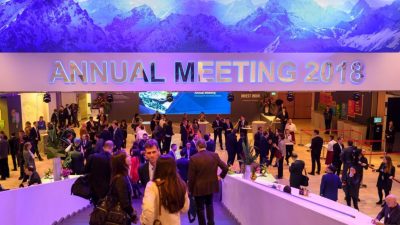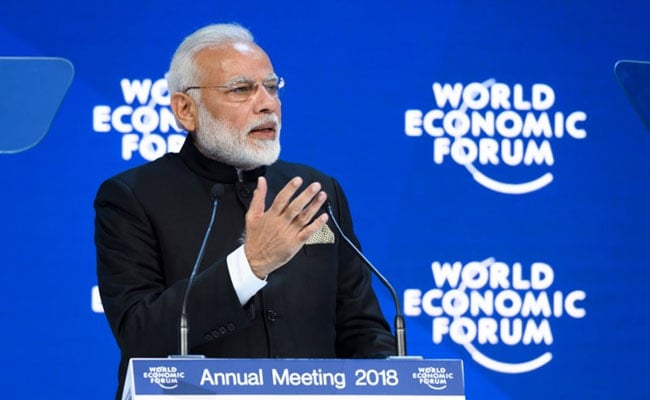World Economic Forum Meets in Davos Under Shadow of Crisis and War

On Tuesday, the World Economic Forum (WEF) opened in the exclusive Swiss Alpine resort of Davos, with some 3,000 corporate executives, government officials and celebrities convening for the ostensible purpose of discussing this year’s theme of “Creating a Shared Future in a Fractured World.”
The gathering is overshadowed, however, by the accelerating fracturing of the global capitalist order, manifested in unprecedented levels of social inequality in every country, a sharp growth in trade war and the ever more immediate threat of an eruption of armed conflict, including nuclear war, between the major powers.
The well-heeled crowd at Davos, paying $55,000 each to attend, is guarded by a small army of 4,000 Swiss troops and 1,000 police, with a no-fly zone imposed overhead. Protests have been banned in the village—on the pretext that there has been too much snow—but thousands of people demonstrated Tuesday in the Swiss financial capital of Zurich in opposition to the WEF and, in particular, to the attendance this year by US President Donald Trump. Marchers carried placards reading, “Trump – You’re not Welcome,” “You Are a Shit-Hole Person” and “Smash WEF.”
The gathering of global billionaire CEOs, bankers and hedge fund managers embodies the very social “fracturing” that the Davos organizers pretend to be addressing. The summit opened just two days after the aid group Oxfam issued its annual report on social inequality, exposing the fact that of all global wealth growth in 2017, 82 percent went to the top one percent, while the bottom half of the world’s population, some 3.8 billion people, saw nothing at all.
Personifying this crisis will be Trump, the first US president to attend the global summit since 2000. He is set to meet with global CEOs on Thursday night and to present his “America First” agenda to the forum in its final session on Friday.
Trump set the stage for his appearance by imposing tariffs against Chinese and South Korean manufacturers amounting to 50 percent on washing machines and 30 percent on solar panels, invoking a rarely used statute to protect domestic manufacturers from “serious injury.” Administration officials portrayed the action as a fulfillment of campaign promises to protect “American workers,” even as the solar power industry forecast that its net result would be the loss of over 23,000 jobs.
China’s commerce ministry responded with a sharply worded statement expressing Beijing’s “strong dissatisfaction” with the tariffs and warning that that China would “resolutely defend its legitimate interests.” There is growing speculation that Trump may follow up his first tariffs with far more consequential ones on steel and aluminum, igniting a full-scale trade war with unpredictable consequences for the global economy.

India’s Prime Minister Narendra Modi gave the opening speech to the WEF, warning,
“Forces of protectionism are raising their heads against globalization. It feels like the opposite of globalization is happening.”
While not naming Trump, it was clear that Modi’s remarks were directed principally against the US administration.
“The negative impact of this kind of mindset cannot be considered less dangerous than climate change or terrorism,” he said.
Much has been made of the supposed stark contradiction between Trump’s right-wing economic nationalism and Davos’ supposed globalist ethos, amid predictions of some kind of a showdown between the US president and his European counterparts, particularly German Chancellor Angela Merkel and French President Emmanuel Macron.
In reality, both Merkel and Macron will have left Davos before Trump even arrives. Moreover, their governments are also pursuing national interests under conditions in which the entire post-World War II system of trading relations established under the aegis of the then-unchallenged dominance of US imperialism is breaking down.
The source of this breakdown is to be found not in the demagogic rants of Donald Trump, but rather the insoluble contradictions of the capitalist system, which is driving every country into a war of each against all in a ruthless struggle for profits and markets. This is creating the same kind of global tensions and conflicts that paved the way to the Second World War.
Both the Wall Street Journal and CNN Tuesday published interviews with leading corporate and financial CEOs in Davos praising Trump for enacting the recent sweeping tax cuts for US corporations and the rich and carrying out unprecedented deregulation of big business.
Citigroup CEO Michael Corbat told CNN that tax cuts would lead to business expansion. “Maybe this is the catalyst that takes us from optimism to confidence.”
“There is extreme optimism,” Sir Michael Sorrell, chief executive of the ad group WPP PLC, told the Journal. “It is remarkable the psychological difference—whatever you think of Trump—that he has brought… It has improved (executives’) already positive psychology.”
The “optimism” and “positive psychology” of this layer is driven by expectations that the vast growth they have experienced in their personal fortunes since the 2008 crash, fueled by free money from the global central banks and sweeping austerity measures imposed upon the world’s population, will now be further accelerated.
There were, however, less sanguine opinions expressed on the opening day. Axel Weber, the chairman of the Swiss banking giant UBS Group AG and former chairman of Germany’s central bank, warned:
“We’re seeing inflation pressures largely ignored. We’re starting to see output gaps closing, with tighter labor conditions and wage pressure… Inflation could come back as a surprise this year.”
The fear of “wage pressure” is well-founded. What more conscious elements within the capitalist ruling class see on the horizon is an explosive growth of the class struggle, which has already found expression in the first weeks of the new year in the mass upheavals in Iran and Tunisia, as well as the wildcat strike by Ford workers in Romania and industrial actions by workers in Germany.
Meanwhile, a televised discussion between CEOs on the first day of the Davos summit heard similar expressions of disquiet.
“It feels like 2006 again,” said Barclays CEO Jes Staley, who insisted that the next crash will not start with the banks.
David Rubenstein, cofounder of the Carlyle Group, a Washington-based global private equity investment firm, warned against the exuberance over the rising stock market,
“Usually when people are happy and optimistic, that’s when something bad happens.”
He cautioned that “black swans,” unanticipated events, including global geopolitical conflicts, could plunge the world into crisis.
The so-called “black swans” are coming home to roost as the conferences and lavish parties play out in Davos.
In Syria, the Turkish invasion of the northwestern Kurdish enclave of Afrin has raised the specter of an armed confrontation between two NATO allies, with Ankara seeking to crush Syrian Kurdish forces on its border that have served as the main proxy ground force for US imperialism’s intervention in the country.
The New York Times warned Tuesday that the invasion was bringing US and Turkish “interests into direct conflict on the battlefield.” The newspaper quoted a security analyst who stated that Washington would have to chose between “another U.S. betrayal of the few groups that have consistently supported and helped the U.S. in Syria and Iraq—or risk indirect and even direct conflict with Turkey, a fellow NATO member.”
The confrontation in Syria comes in the wake of a series of documents issued from Washington—the National Security Strategy, the Nuclear Posture Review and the National Defense Strategy—which lay out a strategic shift by US imperialism toward the open preparation for military confrontations, including nuclear war, with both Russia and China.
US Secretary of State Rex Tillerson issued a statement Tuesday accusing Russia of responsibility for an alleged chemical attack in Syria, signaling Washington’s intention to shift the crisis it is confronting with Turkey to a confrontation with Russia in a country where both Washington and Moscow have military forces.
This is the grim reality overshadowing the supposed “optimism” of the billionaires and multimillionaires gathered in Davos.
*
Featured image is from Sky News.

